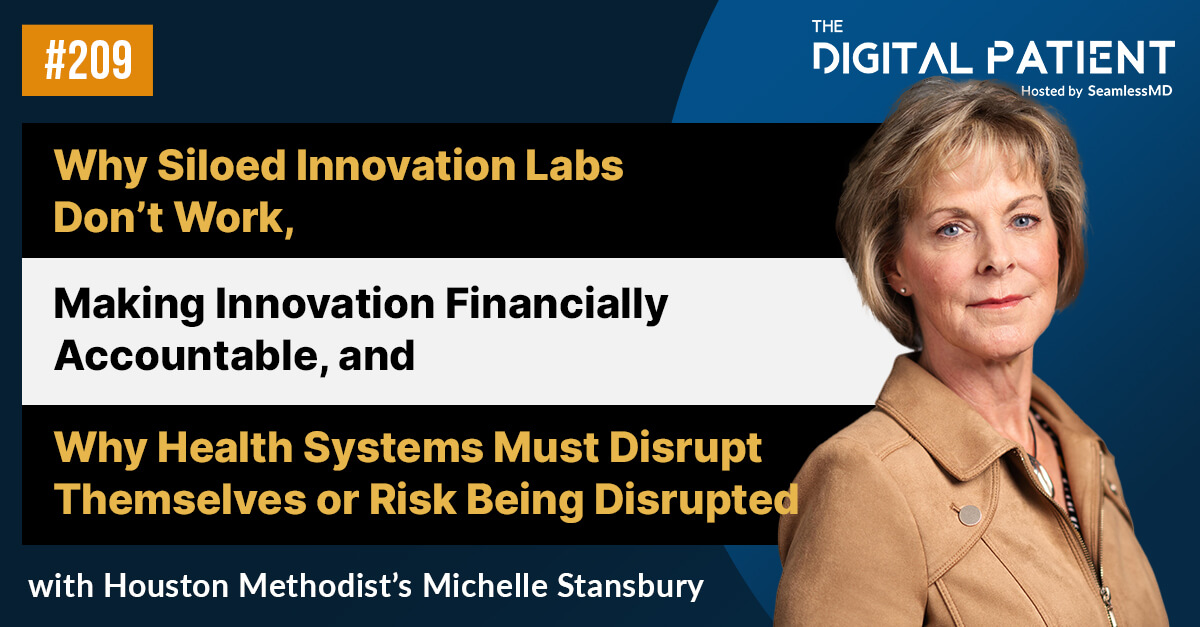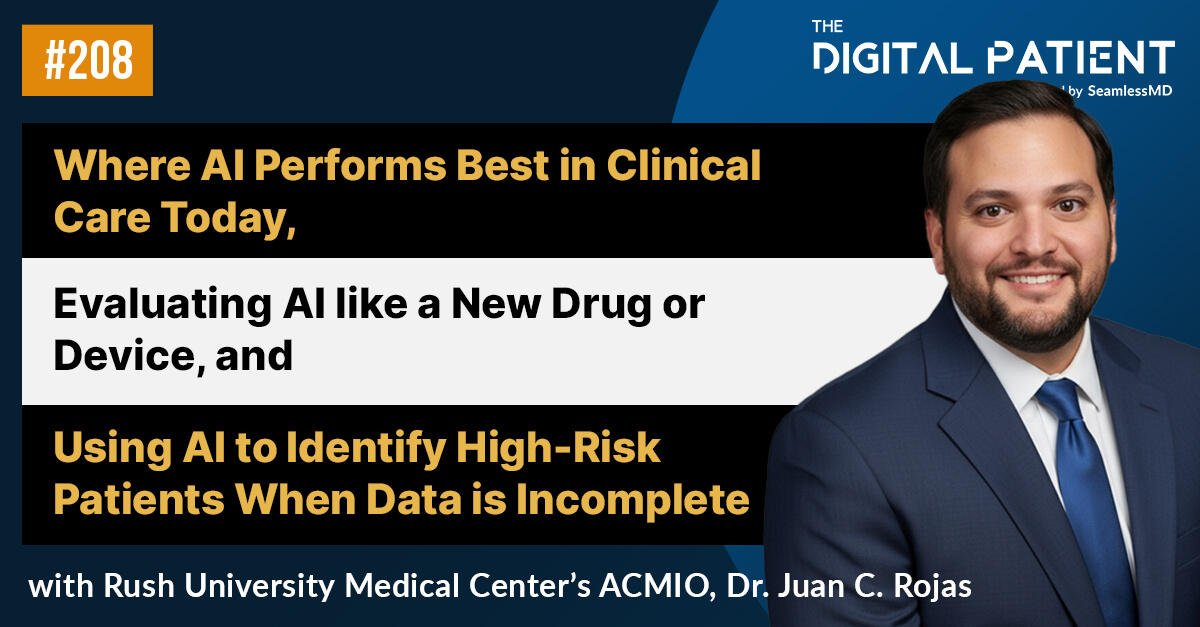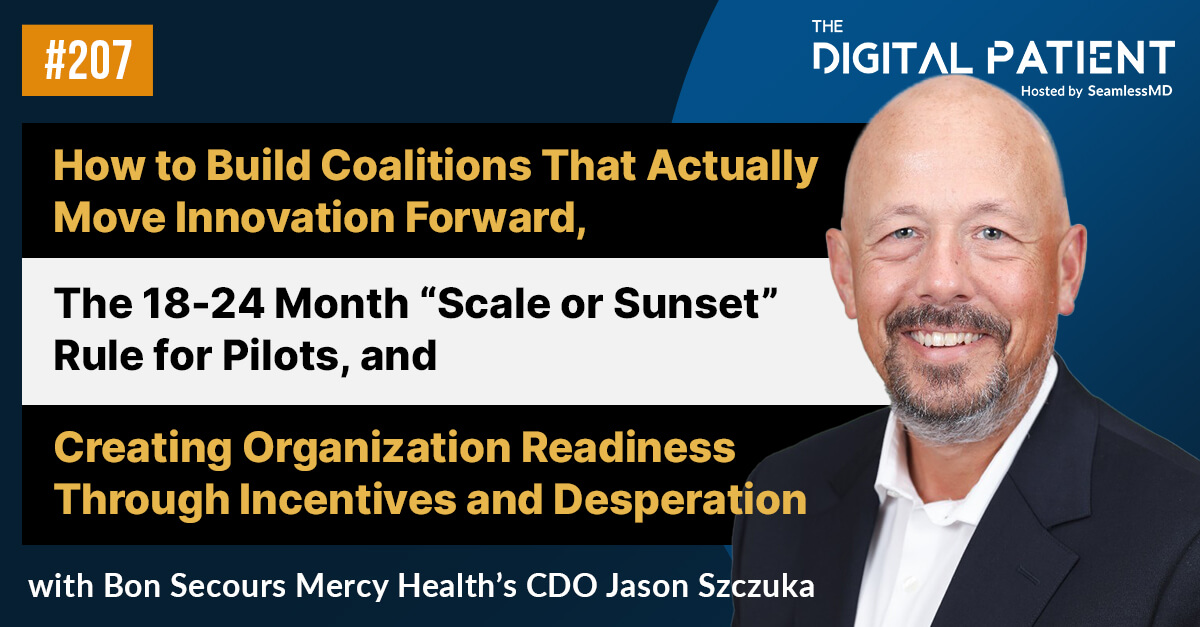Subscribe on: RSS | SPOTIFY | APPLE PODCAST | GOOGLE | BREAKER | ANCHOR
On this episode of "The Digital Patient" podcast, hosts Alan Sardana & Dr. Joshua Liu speak with Dr. James Blum, Chief Medical Information Officer at the University of Iowa, about "Practical implementation of AI and Predictive Modeling for Personalized Care, Improving Patient Access to Care, Focusing Less on Tech Specs and More on Outcomes, and more". Click the play button to listen or read the show notes below.
Audio:
Video:
Guest(s):
- Dr. James Blum, Chief Medical Information Officer at the University of Iowa
- Dr. Joshua Liu (@joshuapliu), Co-founder & CEO at SeamlessMD
Episode 86 - Show Notes:
[00:00] Introducing Dr. James Blum, Chief Medical Information Officer at the University of Iowa;
[1:30] How Dr. Blum got into computers early on in life after his parents got an Apple IIe, how his interests developed further in high school with internet access, and why he ultimately pursued medicine after the death of his grandfather, which was speculated to have happened because of a medical information error;
[6:11] Why Dr. Blum believes coming from the clinical world supports informatics as it enables him to focus on improving patient outcomes and experience while understanding the complexities embedded within technology and technological processes;
[8:15] Why Dr. Blum got into genomics after learning from Francis Collins and Craig Venter while in school at Johns Hopkins, but ultimately landed on critical care as it was a field with large datasets that were practical to use at the time to make an impact on patient lives;
[10:30] How Dr. Blum used data, especially during residency, for research purposes and how this has evolved over time – especially since 2019 – to operational interest and application;
[13:06] How Dr. Blum maintains his focus first and foremost on patient outcomes, which can include improving care delivery and provider happiness, and often reflects on important questions such as how to improve access in rural communities;
[16:10] How large academic institutions have more distributed workflows with trainees vs. community hospitals where physicians may see significantly more patient volume and how this translates to the specific initiatives Dr. Blum pursues such as eliminating physician “pajama time”;
[18:45] Why Dr. Blum believes patient triage is the most important practice for improving access as it enables the system to better spend its resources – technology or human capital – to drive the greatest impact;
[22:35] Why Dr. Blum views most technology as a commodity in that there are several options but the most important one is the one that works on various levels such as streamlining workflow, improving outcomes, clear implementation times, process for staff training, etc.;
[27:00] Why Dr. Blum believes predictive modeling presents a challenge for workflows in that physicians are used to ordering screening test and then definitive tests to inform decisions whereas predictive models would be most applicable for population health where physicians, who understand how the model was attuned, can personalize care;
[32:08] Why Dr. Blum believes predictive modeling presents a chicken or egg dilemma in that the models are not entirely actionable out of the gates but rely on providers interpreting the results and providing more data;
[35:10] Why Dr. Blum believes explainable AI (XAI) is overblown in healthcare and how he would rather physicians receive education on understanding the performing characteristics of the models and how to interpret the results as opposed to why the model is firing;
[38:05] How predictive modeling education curriculum is inevitable and why University of Iowa is starting a clinical informatics fellowship program to get ahead of the curve;
[34:33] Why Dr. Blum is fascinated by genomic data for its ability to inform personalized care for a population and why EHRs will have to adapt to provide appropriate data structures to make genomic data useable;
Fast 5 / Lightning Round:
- What is your favorite book or book you’ve gifted the most?
“Worthy Fights: A Memoir of Leadership in War and Peace” by Leon Panetta
Tom Clancy’s early novels
- Who is a person–dead or alive–you’d love to meet?
“Winston Churchill"
- Would you rather have Super strength, super speed, or the ability to read people’s minds?
“Mind reading”
- What is something in healthcare you believe that others might find insane?
“The entire economic process of healthcare… How we pay for healthcare is beyond nuts.”
- COVID-19 lockdown related – what is 1 hobby or activity you’ve gotten into since the pandemic?
“Flight lessons. I’ve now obtained my flight license, instrument writing, and am in the process to get my commercial rating”
.svg)










.png)
